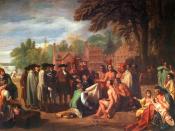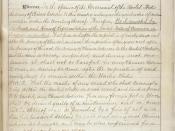Roger Daniels says that immigrants and minorities were faced with struggles and discrimination in America between the years of 1890 and 1924. This book focuses on the social, economic, and political concerns of immigrants and minorities in the late nineteenth and early twentieth century in America. Roger Daniels starts the book by talking about the Chinese Exclusion Act, and ends the book with abolishment of the Act. He states, ?Just as the Chinese Exclusion Act of 1882 was the hinge on which the golden door for immigrants began to swing closed, its repeal in 1943 was the hinge on which it began to open wider? (155). This quote states the outskirts of which the majority of this book is based. Throughout my paper I will inform you of how Roger Daniels has led me to believe his thesis from the book entitled Not Like Us.
I am going to start with specific evidence stated by Roger Daniels which has led me to believe that Native Americans faced struggles and discrimination in America.
The largest stated issue in the book involving Native Americans is their loss of land. The Dawes Act was formed in 1887 which distributed previously owned tribal land to individual Indians. The Dawes Act was originally intended to mold the Indian culture into the white culture. Surplus land was sold to whites, and Indians lost two fifths of their land holdings; so therefore, the Dawes Act failed. In 1903 the Lone Wolf v. Hitchcock case stated that Congress could break Indian treaties and seize Indian land without the consent of tribes or compensating them. It is stated in the book that many entrepreneurs saw Indians as obstacles to economic development because certain reservations contained oil, gas, gold and timber. Theodore Roosevelt created orders which transferred the Forest Service...


